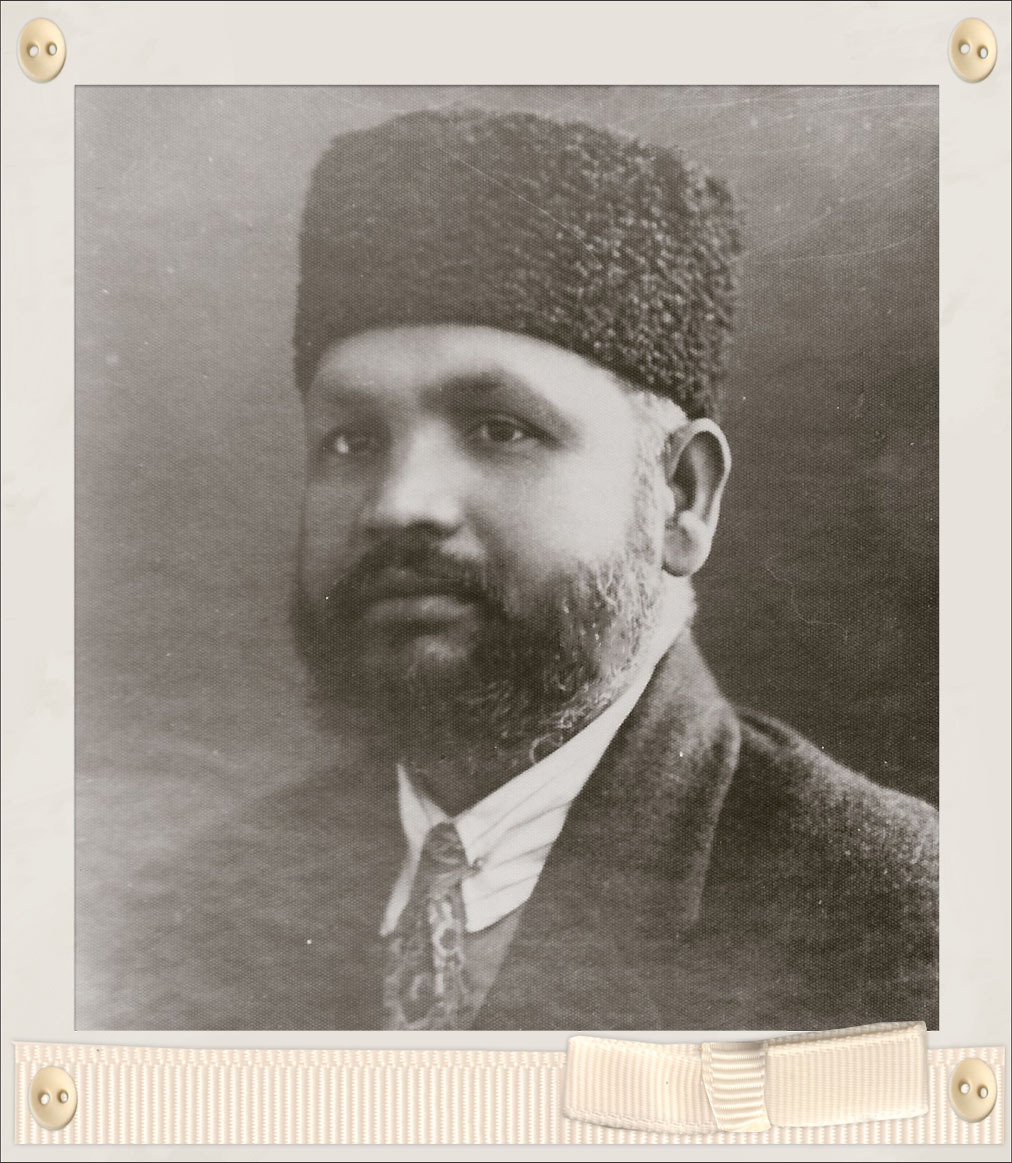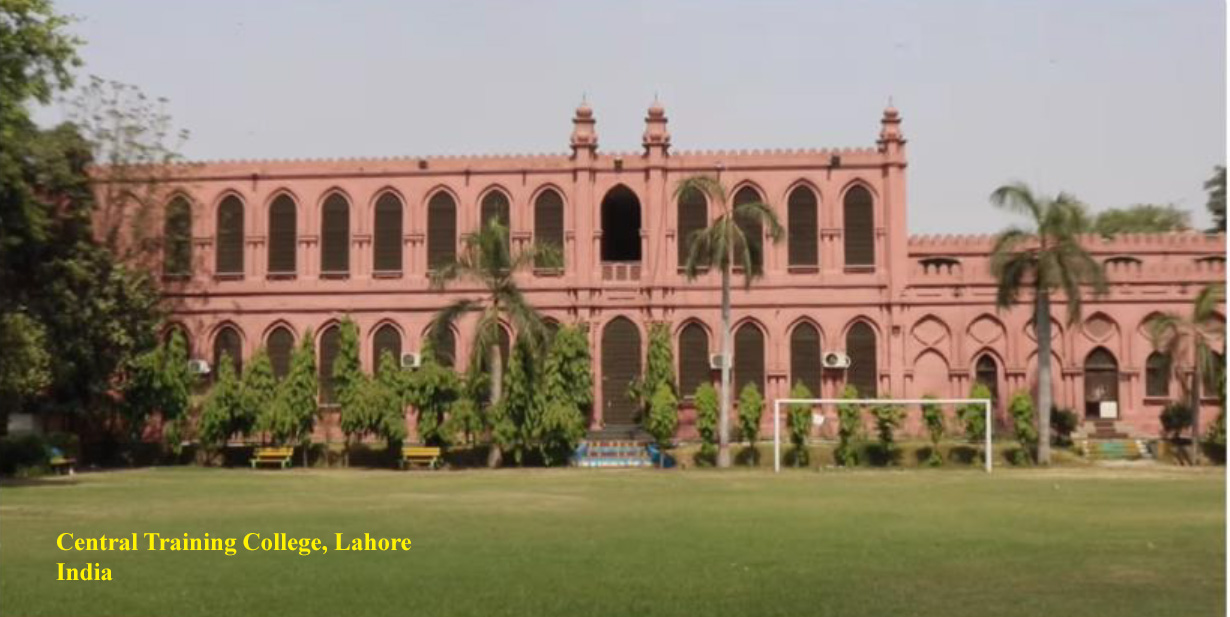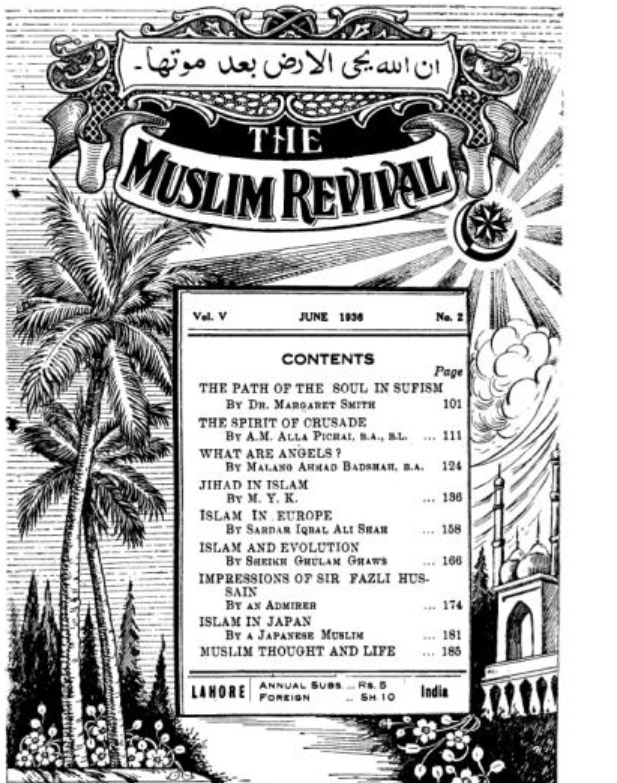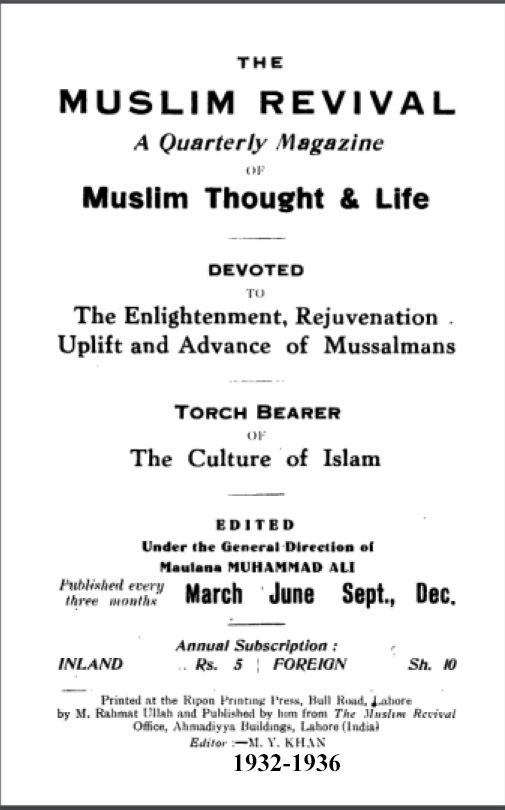Place of Spiritual Values in our System of Education
Secularization: Legacy of a dead past
The substance of a Lecture by Mr Muhammad Yakub Khan (BA,BT) at the Central Training College, Lahore, with Mr G. C. Chatterji I.E.S., Principal, in the chair.
Allow me, first of all, to begin with a personal note. It is a privilege to speak with Mr. Chatterji in the chair. It is, however, a disadvantage as well, and I will tell you how. I happened to be present at one of the Extension Lectures arranged by the University, where Mr. Chatterji presided. In his presidential remarks, he confidently told the audience that he personally liked, while he spoke, to have in the chair a president who knew nothing about the subject and, as such, be unable to criticize his lecture. Keeping that in mind, I do not find myself very happily placed, for here is a President who knows far more about the subject on which I venture to address you.
You will be surprised, however, to know that I myself asked our energetic Secretary, Mr. Safdar Ali, when he approached me for this lecture, to get Mr. Chatterji to preside. I did so because I knew that the proper man to speak on a question like the one before us, which is both delicate and intricate, is Mr Chatterji himself. I was tempted – his speeches are always a temptation – to hear him speak on the subject. The best way to ensure this, I thought, would be to try to put him in the chair. I am thus here more to learn than to teach and with apologies to Mr. Chatterji for having placed this little trick on him, I would address myself to the topic at hand – the place of spiritual values in our educational system.
With regard to this subject, I may at the very outset say that I hold no brief for the sort of religion of which we in this country, unfortunately, have too bitter an experience; Religion that sends man at the throat of fellowman is a misnomer. Religious feeling is a force that should unify rather than disintegrate and expand outlooks and sympathies rather than cramp them. When, therefore, I plead for a place for spiritual values in our educational system, I must begin by asking you to disabuse your minds on this point, which is vital to this discussion. I have no such thing in mind. Just the other way about it, I feel that if a truly spiritual tinge is imparted to our education, scenes such as are enacted in the name of religion may, in the course of time, be eliminated from our public life.
Nor must you misunderstand me to mean that I want our students to be converted into saints with long-drawn faces. That word, somehow, stinks into my nostrils. Blasphemous as it may look, I must say that I never feel so exasperated with a moderate sinner than with a so-called saint. The so-called saint suffers from a sense of superiority-complex, of self-glorification, which, to my mind, is the greatest of sins. Man, to my mind, is the highest goal of man’s endeavour. That must be the goal of all true education – the shaping and moulding of true manhood.
Our schools and colleges must be the foundries where the ore of human material that is put into our hands must be sifted, clarified, purified, refined, and cast into the goodliest of human moulds. I need hardly labour this point as it is a common platitude with all educationists that the aim of education is to bring about the harmonious development of all man’s faculties.
In theory, it is all very well. When it comes to putting the theory into practice, however, we find that the development of faculties that is claimed for education is neither of all the faculties nor harmonious. The development is so lop-sided and topsy-turvy that what we get as a finished product of our machinery of education suffers from some very ugly angularities and lacks some of the finest touches of true humanity.
The man was made in the image of God, as we read in the scriptures. Our educational system tends to ignore, starve and atrophy this essential ingredient of the make-up of human personality, this image of God in man. Man, after all, is no mere physical body. He is body and soul, the two forming one organic whole. Of the two it is the soul that carries abiding value, the body being a mere passing show. Dust thou art, to dust returnest was not spoken of the soul.
Now, what is the place that this element of abiding value occupies in the system of our education? Why do we start with the very denial of this essential part of man when we label the whole of modern education as a secular affair? The idea, perhaps, was the logical corollary of the secularization of the conception of the state. Whatever its origin, this is the legacy we have inherited from a medieval past with the result that humanity in man, that brightest gem of his personality, the higher and abiding nature, is smothered and strangulated from the very moment that the child steps into the temple of education and if after years of schooling, the higher self still survives in him, it is in spite of our educational system that it does so.
I have referred to the origin of our secular conception of education as a “medieval” past in a special sense. It is “medieval” in the sense that it was a reaction against the state of things that prevailed in the Middle Ages when, under the influence of false notions of religion, the spirit of free scientific enquiry was considered taboo. With the dawn of the scientific era set in a reaction, and as is the case with every reaction, the pendulum swung to the other extreme. The tables were turned. Science paid religion back in its own coin. It had the good grace not to start a crusade against religion as had been done by religion in its day against science. It nevertheless went to the other and quite understandable extreme of pronouncing a taboo against religion. That, so far as my knowledge goes, is the origin of the secularization of the entire outlook of man. Secularization came in every department of human life. The state was secularized, education was secularized, and the whole life of man was given a secular turn. Man’s gaze was pinned to the earth, shutting out, perhaps unconsciously, all light of a higher ultraterrestrial life. The cry of the Kingdom of God, the sweet dream of the evangelist, was drowned in the dust and din, the bustle and hurry with which science and its progeny, the machine civilization, filled this planet.
The scientific era had a blighting effect on the soul-values of life in another way as well. As man delved into the mysteries of Nature, subjugated her forces and harnessed them to his own service, he was flushed with a sense of false pride and self-sufficiency. Like a cockerel on a dunghill, he strutted on earth proclaiming, as it were, that he was the master of all he surveyed. Like the frog in the fable, he thought his pond of little knowledge of this universe to be all in all, forgetting that good old adage that there are more things in heaven and earth than our little philosophy can dream of.
Science has already outgrown that fit of temporary insanity. With every new vista that opens up in the hidden realm of the Great Mystery that envelopes this universe, science stands with its Mouth wide agape. The smallest atom, when explored, is found to contain a wealth of mysteries, proclaiming a workmanship that can only leave us to wonder and wonder. Modern science is certainly much chastened and subdued in spirit. It is conscious of some Great Mysterious Power at the heart of existence. If it cannot get at this heart of existence, it now frankly puts it down to its own limitations of equipment. As one leading scientist has put it, it is difficult to prove the existence of God, but it is more difficult still to deny it.
I feel it is time we set about re-setting our educational house in order in the light of this new scientific attitude on life. Science has outgrown its infantile conditions; our educational system, however, is still encumbered with the legacy of that crude attitude. After all, we have the crop that has grown out of the seeds of secularization of life before our eyes. Placing all the emphasis on the body values of human life, western civilization has let loose on humanity a whole crop of dragons, sorrow and suffering, death and destruction following in their wake wherever they stalk. It was not for nothing that a prominent Indian leader described this civilization as Satanic.
As a vivid instance of the vast difference between the relative values of the secularized and spiritualized outlooks on life, we must take a comparative view of the products of the two outlooks. As was said of old, by their fruits shall ye know them; let us compare the fruits of each. What is the fruit of the secular outlook? The gun, the machine gun, the long-range gun, the tank, the dreadnought, the submarine, the torpedo, the bomber and a host of such like machines of destruction. The human type this outlook has given birth to may be seen in the so-called dictators of the West, who are destitute of all human feelings and whose ruthlessness is simply monstrous. In contrast to this, another type is the product of the spiritualized outlook. When the Congress took the ministerial saddle in seven Provinces, Mahatma Gandhi issued a warning to the Ministers. He reminded them that so far, they had been fighters of freedom and given to a life of simplicity, even austerity. In the hour of their power, when they held the reins of Government, they were likely to relax those standards of life. He reminded them that to obviate such a lapse, they must keep before their eyes the example of Abu Bakr and Umar, who, in spite of being kings, lived a life of simplicity and service. This homage to these two great Caliphs of Islam was well deserved. They wielded kingly authority but lived the life of the commonest citizen. Service was their only title to the rulership which was regarded by them as a sacred trust. Abu Bakr drew just a pittance from the state treasury as subsistence allowance, about annas 8 a day. His wife saved a little and, with the savings, added a piece of furniture to the household. When the Caliph came to know about it, he cut down the allowance by the amount of the savings. They could do with so much less, he said. Umar would go round the streets at night to find out the weal and woe of his people. One night he heard cries of children coming from inside a house. On entering, he found a mother sitting by the fireside with her children. On enquiry, the mother told him there was nothing in the house. The children were hungry. In order to while them away, she had kept the kettle on fire with nothing but water. Umar was stung to the quick. He went straight to his house, quite a few miles and lifted a whole bag of flour to carry to the family. A domestic servant offered to do the job for him. “You will not carry my burden on the Day of Judgment”– replied the Caliph, carrying the bag on his own back to the starving family. This is the fruit of the spiritualized outlook on life as contrasted to the secularised outlook, exemplified by fruit like Hitler, Stalin, Mussolini and other European statesmen, all ruthlessly callous in their dealings with humanity.
Every social problem is in the last analysis a problem of education. He must be a poor educationist who stands indifferent and listless while the drama of life goes on around him. Education must keep pace with the march of life. In fact, it must walk ahead, directing the current of life. One system of education, the Western system founded on a secular conception of life, has had its run. It has blown humanity no good wind. It has given greed, oppression, exploitation, a recurring warfare with all its horrors, carnage and bloodshed. It is due, ultimately, to that false outlook on life that humanity knows no peace and is lying torn and bleeding. The cry for a better New World Order has already arisen from the West herself.
This New World Order can be founded only on the ashes of the old order based on secularization. Secularization of life must go, if human civilization is to be saved. Secularization is a partial view of life and, hence, a false view. For a correct view, we must have the whole of the picture before us. What is that picture? It is this: There is a great non-material background of which this brief span of material existence is just a passing projection – a background from which it springs, in which it is rooted and into which it is to merge. This is the whole picture, and if education is to deal with the whole of man, it cannot ignore this background of the picture.
I would call this a totalitarian view of education in the sense that it should tackle the problem of man by taking into account the values of his life in their totality. Partition of life into compartments is both unscientific and deleterious to social health. There is already an awakening to this great fact of life and a tendency to base life and its problems on a wider and wider conception of life. Such principles as the indivisibility of economic prosperity, the indivisibility of war and peace are already in the air. They all indicate that no human problem can be correctly and successfully resolved unless viewed and tackled against the background of humanity in its totality. This is a step in the right direction but a halfway house. The totality of the statesman and economist is itself a partial affair, taking only the limited span of material existence into account. There is a higher totality – the blending of the material manifestation of life with its nonmaterial background. The material and nonmaterial aspects are the two sides of the same picture, and the principle of indivisibility must be pushed further on to cover this ground as well if a correct assessment of the various values of life has to be made.
It is up to India to lead in this direction. The West is supremely incapable of the task, notwithstanding its yearning for a New World Order. It has only one eye sharpened—the materialistic eye. Its eye of the spirit is blind. India, with its rich, spiritual heritage, is pre-eminently the country that should show the way towards the New Order.
You may perhaps be impatient with me for talking to you on New Order and things of that kind, and I have told you nothing about the place of spiritual values in our educational system. As I have already said, education is an essentially human problem, co-extensive with it the entire range of human life and must be based on a correct, comprehensive view of that life. I have, to the best of my light, shown that the time has come to give a reorientation to our system of education based on a purely secular conception of life. A leaven of spiritual values must now be imparted to education in our schools and colleges.
This is no place for a cut-and-dried scheme. I may attempt just a rough outline of what I have in my mind. Instead of lionising such characters in history as Napoleon, Scott, and Edison, why cannot we give the place of honour in our studies to such figures in history as Christ and Krishna, Gautam Buddha, Moses and Muhammad, Nanak and Kabir? I would have the life stories of these spiritual luminaries in one volume and put a copy in the hands of every schoolboy. I would have selections from the Gita, the Gospels, the Quran and the Granth Sahib compiled into one volume and a copy placed in the hand of every boy as part of the prescribed courses. I would find ways and means to impress on our youth minds the common universal Fatherhood of God and brotherhood of man.
I would teach the Hindu boys that the Musalmans are as much the children of God as they are. I would teach the Muslim boys that they alone are not the chosen people of God, that God is interested in all of His children alike, and like his air and sunshine and rain that know no communal or caste distinctions, His blessings go to all alike. I would implant in their tender minds the idea that there is a God who has created us and that we shall reap the reward of what we do in this life. I would inculcate in them hatred of untruth, injustice, bad habits. I would extol simple living and high thinking.
I am afraid I have lapsed into a strain as if I were a dictator. I almost forgot that I am part and parcel of wooden machinery which fights shy of reform, and if it ever makes up its mind to go a little ahead, it moves at a snail’s pace in this fast-moving world. I am sure, however, that when India has a truly national Government of her own, the first thing that the Government would do would be to scrap the whole of this worn-out educational machinery and revolutionize national education. I only hope that if and when that time comes, the revolution of national education may take the line I have outlined and spiritual values of life may be given an effective, even a dominant place in the scheme of education.
(The Light – January 16, 1942)




